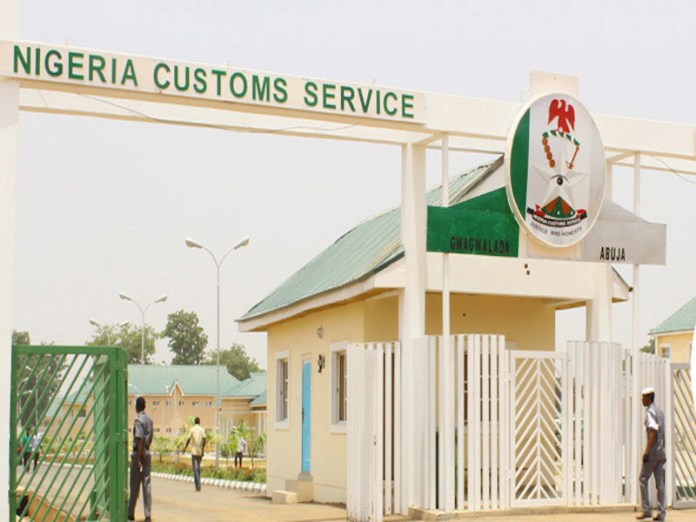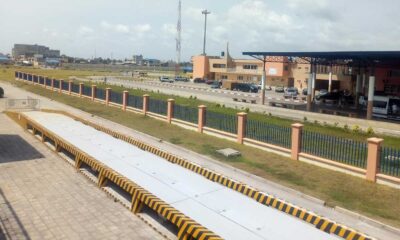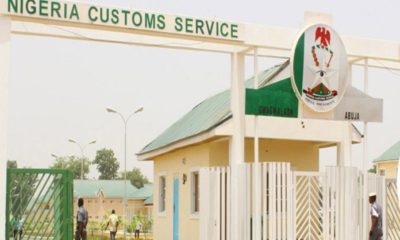- Customs Generates N203.3bn in Apapa, N6.7bn in Ogun
The Apapa Area Command of the Nigeria Customs Service has said it generated total revenue of N203.3bn in the first half of the year.
The Customs Area Controller, Apapa Area Command, Mohammed Abba-Kura, disclosed this during a media briefing in Lagos on Tuesday.
According to him, the amount represents 54.5 per cent of the annual revenue target of N372.6bn set for the Command.
He noted that the amount was N26.5bn above the revenue generated between January and June 2018.
Also during the period under review, a total of 95,229.15 metric tonnes of goods worth N14.3bn were exported from Nigeria through the Apapa Port, Abba-Kura said, adding that most of the items were agricultural and solid minerals products.
To ensure smooth export trade facilitation, he counselled exporters to ensure that all their documentations were completed before moving their cargoes to the port.
Failure to do that, he said, would result in the delay of the goods, loss of time and accumulation of demurrage.
He gave the assurance that the Command would continue to facilitate legitimate, compliant trade for goods whose owners satisfied all the necessary transaction procedures.
“All such consignments will get accelerated clearance from the Customs system,” he stated.
The Command said as part of the fight against smuggling, it intercepted a total of 29 containers whose owners contravened import procedures.
The items seized included tomato paste, vegetable oil, footwear, clothes, tramadol and other drugs as well as armoured glasses without End User Certificates and drilling pipes labelled in a foreign language.
Abba-Kura said between 2018 and 2019, the Command had seized about 42 containers of tramadol.
Apapa Port is reported to generate daily revenue of N4bn into the coffers of the Federal Government.
Meanwhile the Ogun State Area Command of the service says it recorded half-year revenue of N6.7bn, overshooting its targeted revenue of N3.860bn by N2.874bn.
The Command also intercepted 29,905 bags of smuggled foreign rice within the period under review.
The Controller of the Command, Michael Agbara, disclosed this on Tuesday, while briefing journalists about the activities of the command at its Idiroko border office in the state.
While he said that the command had increased the tempo of its anti-smuggling offensive, he added that the operatives also impounded 197 used vehicles popularly known as ‘Tokunbo’ within the period under review.
He noted that the seizure of over 29,905 bags of rice in the first half year of 2019 was indeed a landmark among numerous successes recorded, compared to 15, 976 bags of rice seized during the corresponding period of 2018.
While listing other seizures within the period, Agbara explained that 466 kegs of vegetable oil (25 litres each), 27 units of motorcycles used as means of conveyance, 9,407 pairs of new shoes and 1,042 pairs of used ones were also made.
Other seizures include 427 cartons of frozen poultry products, 25 bales and 29 sacks of second-hand clothing, 12 sacks of Ankara wrappers, 11 sacks of Indian Hemp, 583 pieces of used tyres and 1,181 kegs of Premium Motor Spirit (Petrol) of 25 litres each, among others.

 Naira4 weeks ago
Naira4 weeks ago


 Naira4 weeks ago
Naira4 weeks ago




 Naira4 weeks ago
Naira4 weeks ago




 Naira3 weeks ago
Naira3 weeks ago
 Commodities4 weeks ago
Commodities4 weeks ago


 News4 weeks ago
News4 weeks ago
 Travel4 weeks ago
Travel4 weeks ago




 Naira3 weeks ago
Naira3 weeks ago
















